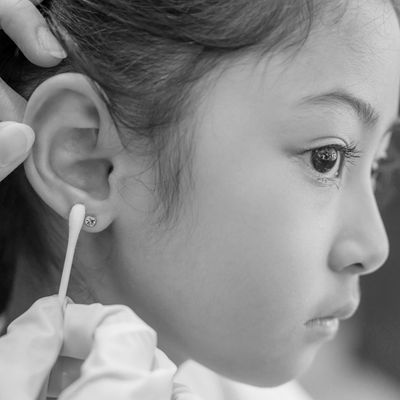

What Parents Need To Know About Ear Piercing & Where To Go
THE LEGALITIES
At what age can you take a child to get their ears pierced?
There is no legal age operating throughout most of the UK on ear piercing, but different borough councils can enforce different rules. At Astrid & Miyu, because we only use needles to pierce, our minimum age is ten. We also only allow lobe piercing from ages ten to 15 and those wanting cartilage piercings must be aged 16 or over.
Must children always be accompanied by a parent – or anyone over the age of 18?
Anyone under 16 must be accompanied by a parent or legal guardian and both must provide a government issue ID before the treatment can take place.
How many piercings can you have done during one session?
We only allow three piercings at once, and any cartilage piercings must be done on the same ear because it’s best not to sleep on fresh piercings where possible.
THE PROCEDURE
What's the best way to pierce ears on younger children – needle or gun?
Needle is always the most hygienic and safest way to be pierced. They cause less trauma to the ear and won't cause any damage to the cartilage, either. The same goes for older teens and adults, too.
Is there a difference in pain between a gun and a needle?
Everyone's pain threshold is different, so it's hard to advise on this one, but we believe the needle method is gentler on the ear and better for safe long-term healing.
Can you use a gun for second and third piercings or will it cause damage?
We always advise against gun piercings in general – whether on the lobe or anywhere else – but you should never pierce cartilage with a gun as it can cause long-term damage if things go wrong.
Do you numb the lobe beforehand?
We never suggest numbing creams as these tend only to numb the top layer of skin. Seeing as a needle goes all the way through the lobe, it can actually make the pain worse because you won’t be expecting it if the top layer is immune.
Is there anything a parent can do to help teens with their first piercing?
Ideally, you want the child to stay as still as possible. All of our piercers are great with younger clients and can talk them through some calming breathing exercises while they get the piercing.
Is it common for young clients to faint?
This can happen, yes, so we always make sure clients have eaten before their appointments and have sweets and water on hand just in case. Piercing appointments are 20 minutes long, so if they need some extra time to lay on the bed afterwards, that's not an issue.
What metals should a piercing earring be made from?
For a fresh piercing, you want to be using titanium or solid gold. They’re the least likely to cause any kind of reaction, which is important for earrings that need to be washed and slept in.
THE WARNING SIGNS
In terms of hygiene and best practice, what should a parent look for at a piercing studio?
My first instinct is always to determine the smell – can you smell disinfectant? You want all the surfaces to be clean and clear, and all the tools should be sealed in packets that are opened for the first time in front of you. The store piercing licence should also be up on the wall for you to see.
As a parent, what red flags should stop you continuing with the procedure?
The piercer shouldn't touch anything else between washing their hands and doing the piercing. Also, how and where were they trained? Studios using guns watch a three-hour video on how to pierce whereas needle piercers normally do a few weeks or even months of training. Never ever feel pressured to go through with the piercing if you are unsure of any of these things. They should also present a detailed consent form explaining the risks to you and your child.
THE AFTERCARE
What’s your best aftercare advice?
Be patient. Everyone’s body reacts differently and healing times can vary for different reasons. Also, with clean hands, make sure to clean the piercing twice a day front and back, making sure to dry the piercing after. Try to avoid sleeping on the piercing for up to four weeks (you can use a little travel pillow with the hole in it for this) and apart from regular cleaning, do not touch or play with the piercing. The only reason you should touch it is to make sure it’s secure after cleaning.
What do you need to know about changing earrings for the first time?
Ideally, you would want to stick to sterling silver and try to avoid anything with nickel. For cartilage piercings that are kept in for longer, stick to a flat back labret style in either titanium or solid gold.
Are high-street earrings likely to cause irritation?
There are some really great high-street jewellery brands now that do cater for specific piercings; it's all about checking which metal they’re made out of – people have such different sensitivities, so it's hard to say yes or no in absolute terms.
What is the most common cause of infection?
Some people are just more prone to infections – which is why some people with auto-immune conditions will need a doctor’s note to be pierced. Over-touching the piercing and not cleaning it daily will be the biggest cause of infection, generally speaking. At any sign of infection, we suggest visiting a GP and following the doctor’s advice.
How do you tape them properly for school or playing sport?
Ideally, the start of the six weeks of summer holidays is the best time to get pierced (as long as there are no trips abroad booked for up to four weeks afterwards) as this gives children lots of healing time before needing to do this. Otherwise, there’s no real technique to it, they just need to be secure. But on the whole, we recommend finding the right time when it won’t be necessary.
FINALLY, WHERE TO GO
DISCLAIMER: We endeavour to always credit the correct original source of every image we use. If you think a credit may be incorrect, please contact us at info@sheerluxe.com.


